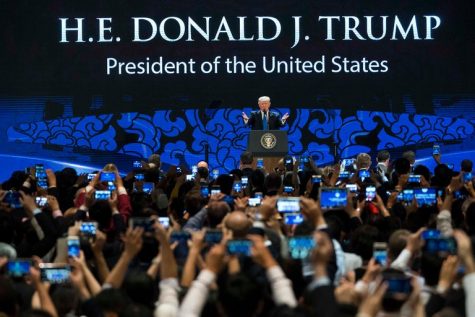The Ripple Effect: Flattery, foreign relations and forbidden shrimp
Trump was quiet on the wrong things during his Asia trip

Out of all the coverage of Donald Trump’s recent trip to Asia, I didn’t expect to read stories about the president eating something controversial. No, he didn’t reject a traditional meal cooked by another leader’s great-grandmother; rather, according to the BBC, he was served prawns from the waters around a contested area claimed by both Japan and South Korea.
Apart from his culinary adventures, another dangerously childish back-and-forth on Twitter with Kim Jong-Un and getting flak for following the lead of Japan’s prime minister while feeding fish, Trump spent much of the trip uneventfully. In keeping with his plan of building good relations with various Asian leaders, he played flattery ping-pong with all of them. Trump has a “great” relationship with China’s Xi Jinping, thinks Japan’s Shinzo Abe is “doing a wonderful job” and has a “warm rapport” with the Philippines’ Rodrigo Duterte.
Yet throughout all the praise Olympics, not one word appears to have spoken about human rights violations in those respective countries, except in the vaguest terms possible.
This is most egregious in the case of the Philippines, where Duterte is making good on his old campaign promise of cracking down on crime and drugs with deadly force. “There are 3 million drug addicts. I’d be happy to slaughter them,” Duterte has said in the past, according to CBS News.
The Philippine drug war has gone on for a year now. Thousands are dead.
And those dead aren’t big-time drug kingpins; rather, many are small-time drug users and dealers, killed both by police and through what the Human Rights Watch calls “unlawful executions.”
Certainly, seeing as part of Trump’s main agenda in Asia was to cement relations with other leaders, denouncing their practices would be antithetical to that goal. Or perhaps Trump wants to avoid being on the receiving end of the same reaction Canadian Prime Minister Justin Trudeau was met with Tuesday upon bringing the issue up. According to the Washington Post, after all, Duterte saw the inquiry as “a personal and official insult.”
Yet staying silent on such issues is beneficial to no one. Maybe other, geographically closer nations should speak out — and rightly so — but America can’t keep silent now when it’s positioned itself as the arbiter of democracy and human rights in countless other places since the end of the Cold War.
America doesn’t have the authority of a commanding figure standing right next to you and shouting about democracy, but it has set itself up to seem that way no matter the distance, and that projection should be maintained if human rights are under fire. Looking the other way when those you have “a great relationship with” are committing wrongdoings only invites allegations of hypocrisy and more suspicion from other potential allies.








Anonymous • Nov 15, 2017 at 9:59 pm
Duterte did nothing wrong.